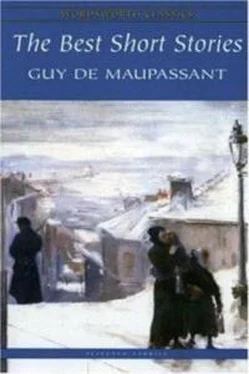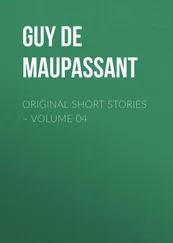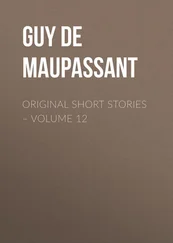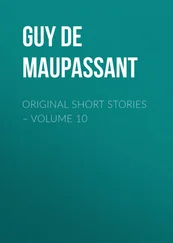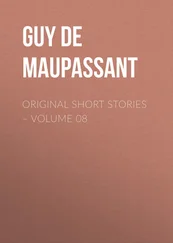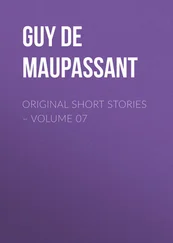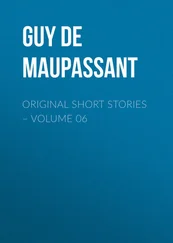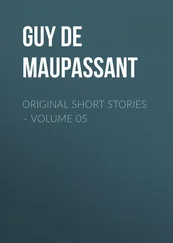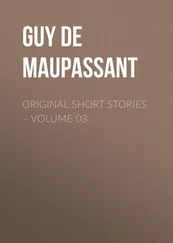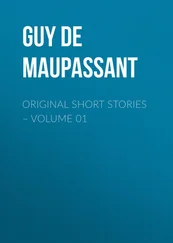"How many hours slipped away? There I was without sleeping, powerless, crushed, my eyes wide open, my legs stretched out, my body limp, inanimate, and my mind torpid with despair. Suddenly the great doorbell, the great bell of the vestibule, rang out.
"I started so that my chair cracked under me. The solemn, ponderous sound vibrated through the empty country house as through a vault. I turned round to see what the hour was by the clock. It was just two in the morning. Who could be coming at such an hour?
"And, abruptly, the bell again rang twice. The servants, without doubt, were afraid to get up. I took a wax candle and descended the stairs. I was on the point of asking: 'Who is there?'
"Then I felt ashamed of my weakness, and I slowly drew back the heavy bolts. My heart was throbbing wildly. I was frightened. I opened the door brusquely, and in the darkness I distinguished a white figure, standing erect, something that resembled an apparition.
"I recoiled petrified with horror, faltering:
"'Who–who–who are you?'
"A voice replied:
"'It is I, father.'
"It was my daughter.
"I really thought I must be mad, and I retreated backward before this advancing spectre. I kept moving away, making a sign with my hand,' as if to drive the phantom away, that gesture which you have noticed—that gesture which has remained with me ever since.
"'Do not be afraid, papa,' said the apparition. 'I was not dead. Somebody tried to steal my rings and cut one of my fingers; the blood began to flow, and that restored me to life.'
"And, in fact, I could see that her hand was covered with blood.
"I fell on my knees, choking with sobs and with a rattling in my throat.
"Then, when I had somewhat collected my thoughts, though I was still so bewildered that I scarcely realized the awesome happiness that had befallen me, I made her go up to my room and sit dawn in my easy–chair; then I rang excitedly for Prosper to get him to rekindle the fire and to bring some wine, and to summon assistance.
"The man entered, stared at my daughter, opened his mouth with a gasp of alarm and stupefaction, and then fell back dead.
"It was he who had opened the vault, who had mutilated and then abandoned my daughter; for he could not efface the traces of the theft. He had not even taken the trouble to put back the coffin into its place, feeling sure, besides, that he would not be suspected by me, as I trusted him absolutely.
"You see, monsieur, that we are very unfortunate people."
He was silent.
The night had fallen, casting its shadows over the desolate, mournful vale, and a sort of mysterious fear possessed me at finding myself by the side of those strange beings, of this young girl who had come back from the tomb, and this father with his uncanny spasm.
I found it impossible to make any comment on this dreadful story. I only murmured:
"What a horrible thing!"
Then, after a minute's silence, I added:
"Let us go indoors. I think it is growing cool."
And we made our way back to the hotel.
In the Wood
As the mayor was about to sit down to breakfast, word was brought to him that the rural policeman, with two prisoners, was awaiting him at the Hotel de Ville. He went there at once and found old Hochedur standing guard before a middle–class couple whom he was regarding with a severe expression on his face.
The man, a fat old fellow with a red nose and white hair, seemed utterly dejected; while the woman, a little roundabout individual with shining cheeks, looked at the official who had arrested them, with defiant eyes.
"What is it? What is it, Hochedur?"
The rural policeman made his deposition: He had gone out that morning at his usual time, in order to patrol his beat from the forest of Champioux as far as the boundaries of Argenteuil. He had not noticed anything unusual in the country except that it was a fine day, and that the wheat was doing well, when the son of old Bredel, who was going over his vines, called out to him: "Here, Daddy Hochedur, go and have a look at the outskirts of the wood. In the first thicket you will find a pair of pigeons who must be a hundred and thirty years old between them!"
He went in the direction indicated, entered the thicket, and there he heard words which made him suspect a flagrant breach of morality. Advancing, therefore, on his hands and knees as if to surprise a poacher, he had arrested the couple whom he found there.
The mayor looked at the culprits in astonishment, for the man was certainly sixty, and the woman fifty–five at least, and he began to question them, beginning with the man, who replied in such a weak voice that he could scarcely be heard.
"What is your name?"
"Nicholas Beaurain."
"Your occupation?"
"Haberdasher, in the Rue des Martyrs, in Paris."
"What were you doing in the wood?"
The haberdasher remained silent, with his eyes on his fat paunch, and his hands hanging at his sides, and the mayor continued:
"Do you deny what the officer of the municipal authorities states?"
"No, monsieur."
"So you confess it?"
"Yes, monsieur."
"What have you to say in your defence?"
"Nothing, monsieur."
"Where did you meet the partner in your misdemeanor?"
"She is my wife, monsieur."
"Your wife?"
"Yes, monsieur."
"Then—then—you do not live together–in Paris?"
"I beg your pardon, monsieur, but we are living together!"
"But in that case—you must be mad, altogether mad, my dear sir, to get caught playing lovers in the country at ten o'clock in the morning."
The haberdasher seemed ready to cry with shame, and he muttered: "It was she who enticed me! I told her it was very stupid, but when a woman once gets a thing into her head—you know—you cannot get it out."
The mayor, who liked a joke, smiled and replied: "In your case, the contrary ought to have happened. You would not be here, if she had had the idea only in her head."
Then Monsieur Beauain was seized with rage and turning to his wife, he said: "Do you see to what you have brought us with your poetry? And now we shall have to go before the courts at our age, for a breach of morals! And we shall have to shut up the shop, sell our good will, and go to some other neighborhood! That's what it has come to."
Madame Beaurain got up, and without looking at her husband, she explained herself without embarrassment, without useless modesty, and almost without hesitation.
"Of course, monsieur, I know that we have made ourselves ridiculous. Will you allow me to plead my cause like an advocate, or rather like a poor woman? And I hope that you will be kind enough to send us home, and to spare us the disgrace of a prosecution.
"Years ago, when I was young, I made Monsieur Beaurain's acquaintance one Sunday in this neighborhood. He was employed in a draper's shop, and I was a saleswoman in a ready–made clothing establishment. I remember it as if it were yesterday. I used to come and spend Sundays here occasionally with a friend of mine, Rose Leveque, with whom I lived in the Rue Pigalle, and Rose had a sweetheart, while I had none. He used to bring us here, and one Saturday he told me laughing that he should bring a friend with him the next day. I quite understood what he meant, but I replied that it would be no good; for I was virtuous, monsieur.
"The next day we met Monsieur Beaurain at the railway station, and in those days he was good–looking, but I had made up my mind not to encourage him, and I did not. Well, we arrived at Bezons. It was a lovely day, the sort of day that touches your heart. When it is fine even now, just as it used to be formerly, I grow quite foolish, and when I am in the country I utterly lose my head. The green grass, the swallows flying so swiftly, the smell of the grass, the scarlet poppies, the daisies, all that makes me crazy. It is like champagne when one is not accustomed to it!
Читать дальше
